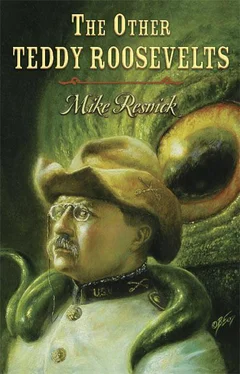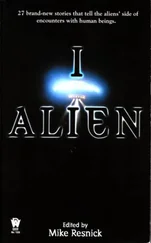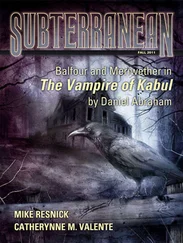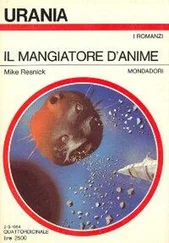“Then we have a deal?”
“Not until I meet him and decide if he’s the man I need.”
“And if he’s not?” persisted Eye-Patch.
“Then you’ll be no worse off than you are now,” said Roosevelt.
“What happens to the photos if he kills you?” asked Baldy.
“You think he might?” asked Roosevelt.
“Anything’s possible,” said Baldy. “He’s a strange one, that Big D.” He paused uncomfortably. “So if he decides to kill you…” He let the sentence hang in the air.
“He’ll find out what it’s like to be up against a Harvard boxing champion,” answered Roosevelt. “It’s Wednesday morning. Can you get in touch with him in time for him to come to the room tomorrow night?”
“This town’s got a pretty good grapevine,” said Eye-Patch.
“Bully! The sooner we get the crusade under way, the better. Gentlemen, you’re free to go.”
Eye-Patch began walking toward the end of the cell block, but Baldy hung back for a moment.
“I don’t figure I owe you nothing, the way you tricked us,” he said to Roosevelt. He lowered his voice. “But watch yourself around him, sir.” He made no attempt to hide the little shudder that ran through him. “I’m not kidding, sir. I ain’t never been scared of nobody or nothing, but I’m scared of him .”
* * *
Roosevelt went to his squalid Bowery room on Thursday night, laid his hat and a walking stick on a chair, and waited. He’d brought a book with him, in case this Big D character hadn’t gotten the word or chose not to show up, and by midnight he was pretty sure he’d be reading straight through until dawn.
And then, at 2:30 AM, there was a knock at the door.
“Come,” said Roosevelt, who was sitting on an oft-repaired wooden chair. He closed the book and put it on the ugly table that held the room’s only lamp.
The door opened and a tall, skeletally thin man entered. He had wild black hair that seemed to have resisted all efforts to brush or comb it, piercing blue eyes, and very pale skin. He wore an expensively-tailored black suit that had seen better days.
“I understand you wish to speak to me,” he said, articulating each word precisely.
“If you’re Big D, I do,” said Roosevelt.
A smile that Roosevelt thought seemed almost indistinguishable from a sneer briefly crossed the man’s face. “I am the man you seek. But my name is not Big D.”
“Oh?”
“They call me that because they are too uneducated to pronounce my real name. But you, Mr. Roosevelt, will have no difficulty with it.”
“I didn’t give my…ah… representatives permission to reveal my identity.”
“They didn’t,” was the reply. “But you are a famous and easily-recognized man, sir. I have read many of your books, and seen your photograph in the newspapers.”
“You still have the advantage of me,” said Roosevelt. “If you are not to be called Big D…”
“You may call me Demosthenes.”
“Like the ancient Greek?”
“Precisely,” said Demosthenes.
“The Greeks are a swarthy race,” said Roosevelt. “You don’t look Mediterranean.”
“I have been told that before.”
“The hair seems right, though.”
“Are we to discuss my looks or your proposition?” said Demosthenes.
“My proposition, by all means,” said Roosevelt. He gestured toward a chair. “Have a seat.”
“I prefer to stand.”
“As you wish. But I must tell you that I am not intimidated by size.”
Demosthenes smiled and sat down. “I like you already, Mr. Roosevelt. But from your books I knew I would. You take such pleasure in the slaughter of animals who want only to escape.”
“I am a hunter and a sportsman, not a slaughterer,” answered Roosevelt severely. “I shoot no animal that does not have a chance to escape.”
“How inefficient,” said Demosthenes. He cocked his head and read the spine of Roosevelt’s book. “Jane Austen? I should have thought you were beyond a comedy of manners, Mr. Roosevelt.”
“She has an exquisite felicity of expression which seems to have eluded you,” said Roosevelt.
“Her felicity of expression is duly noted.” Another cold smile. “It is manners that elude me.”
“So I’ve noticed. Shall we get down to business?”
“Certainly,” said Demosthenes. “Which particular criminal are you after?”
“What makes you think I’m after a criminal?” asked Roosevelt.
“Do not be obtuse, Mr. Roosevelt,” said Demosthenes. “I move freely among the criminal element. Two lawbreakers have passed the word that you wished to meet with me. What other reason could you possibly have for this extravagant charade?”
“All right,” said Roosevelt. “At present three men control seventy percent of the crime in Manhattan: William O’Brien, Antonio Pascale, and Israel Zuckerman. Thus far my men have been unable to ferret them out. I have been told that you have access to them and the ability to adapt to dangerous situations. The City of New York will pay you a one thousand dollar bounty for each one you deliver tomy office.”
“And you think this will end crime in Manhattan?” asked Demosthenes, amused.
“No, but we have to start somewhere, and I prefer starting at the top. Each of them will implicate dozens of others if it will get them lighter sentences.” Roosevelt paused and stared at the tall man. “Can you do it?”
“Of course.”
“ Will you do it?”
“Yes.”
“I’ll expect you to keep this agreement confidential,” said Roosevelt. “Say one word of it to anyone else and I will feel no obligation to fulfill my end of it.”
“I will say nothing of it,” answered Demosthenes. “It is comforting to note that even the remarkable Theodore Roosevelt breaks the law when it suits his purposes.”
“Only to apprehend greater lawbreakers. I don’t question your morality or methodology; I’ll thank you not to question mine.”
“O’Brien, Pascale, Zuckerman,” said Demosthenes. “Have the money ready, Mr. Roosevelt.”
“I’ll be in my office every afternoon.”
“ I won’t.” Before Roosevelt could object, he held up a hand. “These men hide by day and come out at night. It is at night that I shall apprehend them.”
He turned and walked out of the room without another word.
* * *
Roosevelt went back to his Manhattan apartment and slept most of the day on Friday. He arose in late afternoon, had a hearty meal, and walked to his office just after sunset —
— and found the body of Antonio Pascale on the floor.
Damn! thought Roosevelt. I told him I wanted this man alive for questioning!
He inspected the body more closely. It seemed even more pale than Demosthenes. Pascale had a blue silk scarf wrapped around his neck. Roosevelt moved it, and found that his throat had been ripped out.
Roosevelt wasn’t sickened by the sight. He’d done too much taxidermy, spent too much time in the wilderness, to turn away in horror or disgust…but he was puzzled. Did Demosthenes keep a killer dog he hadn’t mentioned? Roosevelt tried to reconstruct their meeting in his mind. Could Demosthenes possibly have misunderstood that Roosevelt wanted to get information from the gang leader?
Roosevelt summoned a team of policemen and had them take the body down to the morgue, then sat down heavily on his office chair. How could he get hold of Demosthenes before he killed another man with information Roosevelt needed?
He was still pondering the problem a few hours later when Demosthenes, his color a bit darker and richer than the previous evening, stepped through the doorway, lowering his head to avoid bumping it against the molding. “You owe me a thousand dollars, Mr. Roosevelt.”
Читать дальше










